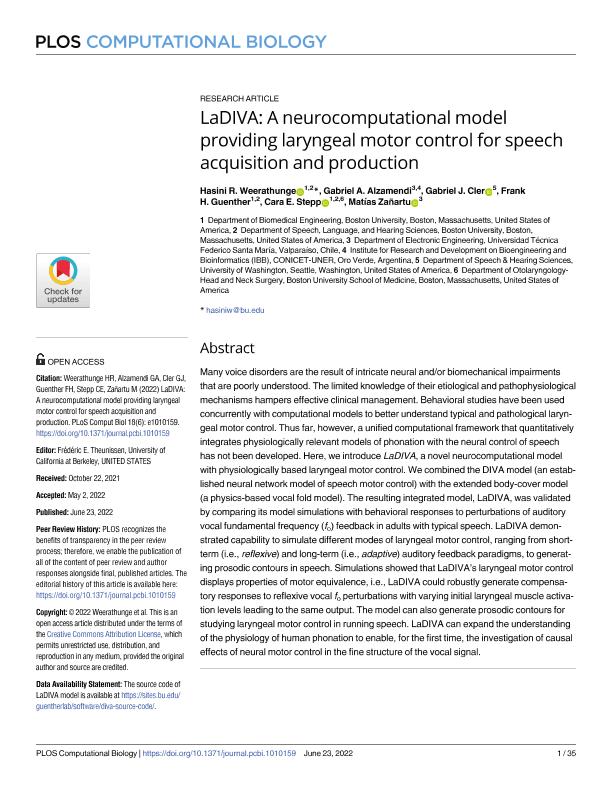Artículo
LaDIVA: A neurocomputational model providing laryngeal motor control for speech acquisition and production
Weerathunge, Hasini R.; Alzamendi, Gabriel Alejandro ; Cler, Gabriel J.; Guenther, Frank H.; Stepp, Cara E.; Zañartu, Matías
; Cler, Gabriel J.; Guenther, Frank H.; Stepp, Cara E.; Zañartu, Matías
 ; Cler, Gabriel J.; Guenther, Frank H.; Stepp, Cara E.; Zañartu, Matías
; Cler, Gabriel J.; Guenther, Frank H.; Stepp, Cara E.; Zañartu, Matías
Fecha de publicación:
06/2022
Editorial:
Public Library of Science
Revista:
Plos Computational Biology
ISSN:
1553-734X
Idioma:
Inglés
Tipo de recurso:
Artículo publicado
Clasificación temática:
Resumen
Many voice disorders are the result of intricate neural and/or biomechanical impairments that are poorly understood. The limited knowledge of their etiological and pathophysiological mechanisms hampers effective clinical management. Behavioral studies have been used concurrently with computational models to better understand typical and pathological laryngeal motor control. Thus far, however, a unified computational framework that quantitatively integrates physiologically relevant models of phonation with the neural control of speech has not been developed. Here, we introduce LaDIVA, a novel neurocomputational model with physiologically based laryngeal motor control. We combined the DIVA model (an established neural network model of speech motor control) with the extended body-cover model (a physics-based vocal fold model). The resulting integrated model, LaDIVA, was validated by comparing its model simulations with behavioral responses to perturbations of auditory vocal fundamental frequency (fo) feedback in adults with typical speech. LaDIVA demonstrated capability to simulate different modes of laryngeal motor control, ranging from short-term (i.e., reflexive) and long-term (i.e., adaptive) auditory feedback paradigms, to generating prosodic contours in speech. Simulations showed that LaDIVA’s laryngeal motor control displays properties of motor equivalence, i.e., LaDIVA could robustly generate compensatory responses to reflexive vocal fo perturbations with varying initial laryngeal muscle activation levels leading to the same output. The model can also generate prosodic contours for studying laryngeal motor control in running speech. LaDIVA can expand the understanding of the physiology of human phonation to enable, for the first time, the investigation of causal effects of neural motor control in the fine structure of the vocal signal.
Palabras clave:
LaDIV
,
neurocomputational model
,
laryngealmotorcontrol
Archivos asociados
Licencia
Identificadores
Colecciones
Articulos (IBB)
Articulos de INSTITUTO DE INVESTIGACION Y DESARROLLO EN BIOINGENIERIA Y BIOINFORMATICA
Articulos de INSTITUTO DE INVESTIGACION Y DESARROLLO EN BIOINGENIERIA Y BIOINFORMATICA
Citación
Weerathunge, Hasini R.; Alzamendi, Gabriel Alejandro; Cler, Gabriel J.; Guenther, Frank H.; Stepp, Cara E.; et al.; LaDIVA: A neurocomputational model providing laryngeal motor control for speech acquisition and production; Public Library of Science; Plos Computational Biology; 18; 6; 6-2022; 1-35
Compartir
Altmétricas



